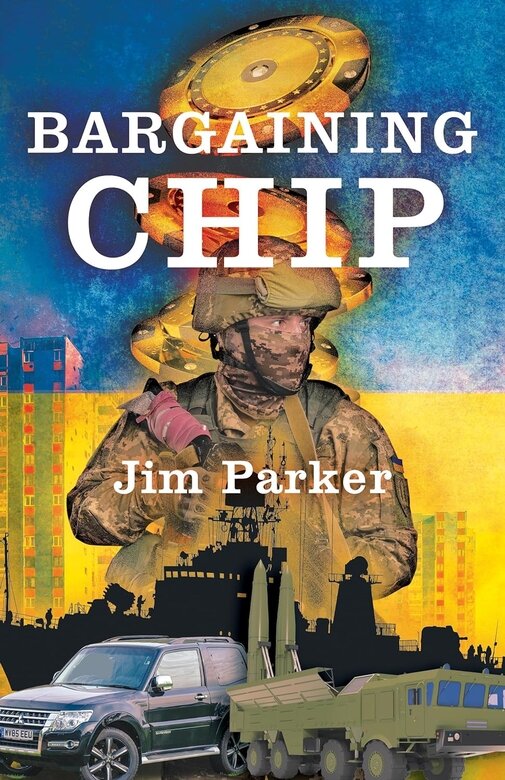
Putting a fictional spin on a real-world conflict, Bargaining Chip by Jim Parker is a bold and nuanced reimagining of Putin’s war against Ukraine, resulting in a tense and timely thriller.
In this slightly tweaked reality, the Russian superpower has found the scrappy Ukrainian military to be a surprisingly resilient enemy, and while victories and losses have been traded by both sides, the Ukrainian president knows that NATO and American support may not last forever. In a desperate attempt to turn the tide of war and take the fight to Russia, a daring counteroffensive is planned – one that will give Ukraine the leverage it needs to finally end the violence.
The story unfurls patiently, showing the nuanced depths and relentless determination of a country fighting for its very survival. From Ukrainian command centers and nuclear storage bunkers to clandestine intelligence meetings and secret Polish staging areas, the narrative weaves through countless steps and schemes to get the jump on one of the world’s strongest military powers, as if the reader is looking down at a sprawling and dynamic battlefield.
Written in an epistolary style, through day-by-day entries, the plot dives deep into certain events and flashpoints in the broader mission, but also considers and explores the interconnected web of alliances and ideologies that complicate any international conflict. Coordinating surprise ground assaults and naval advances while rooting out informants and organizing a massive troop redistribution requires an incredible amount of communication and management; watching how an army functions from the inside out is fascinating, even for readers who might not typically seek out this genre. The intense focus on key figures’ opinions, experiences, and perspectives also humanizes these types of political and military leaders who are too often placed on pedestals of unquestioned power.
Although this is a fictional narrative, the players and contemporary context are torn from today’s headlines, demonstrating an intense level of research and knowledge about the ongoing conflict. Parker’s decades of service in the armed forces give him an unparalleled perspective on how things happen in combat zones, who calls the shots when lives are on the line, and what the ultimate stakes of war truly are. For military buffs and those who are curious about the bureaucratic backend of battlefield operations, Parker provides a detailed glimpse behind the scenes, blurring the lines of reality and fiction in a seamless way. The gritty realism of wartime decision-making, the complexity of geopolitical alliances, and the temerity of Ukraine as the overmatched underdog make this a gripping and insightful read.
On the technical side, the writing is meticulously detailed, but can sometimes verge on journalistic or clinical in its depictions of people, spaces, emotions, and motivations. In some cases, the prose tells more than shows, procedurally explaining the minutiae of physical movement by a character, or diving deep into exposition that isn’t wholly relevant or needed for that particular scene. It is also somewhat jarring for idiomatic English phrasing to be used by Ukrainian characters, without any obvious attempt to insert colloquial speech patterns of Eastern Europe.
Despite these superficial concerns, the author has crafted a read that is at once a useful primer for this contemporary crisis and an engrossing piece of wartime fiction.
Book Links
STAR RATING
Design
Content
Editing
Get an Editorial Review | Get Amazon Sales & Reviews | Get Edited | Get Beta Readers | Enter the SPR Book Awards | Other Marketing Services























Leave A Comment